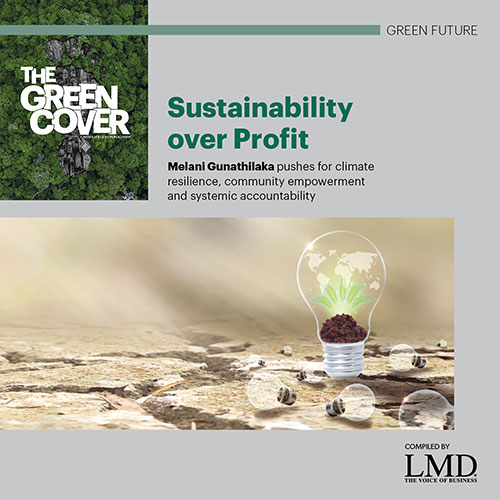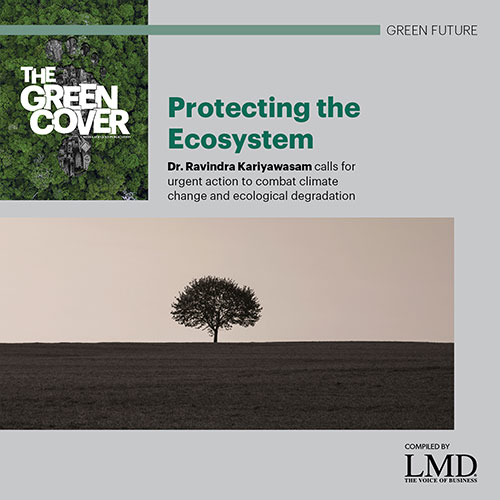SOCIAL SUSTAINABILITY
Sustainable Prosperity
The term ‘sustainable development’ was introduced in the UN’s Brundtland Report (entitled ‘Our Common Future’) in 1987. It defines sustainability as “meeting the needs of the present without compromising the ability of future generations to meet their own needs.”
After years of industrial revolution, the world realised that neglecting environmental health and social equity does not drive the world to a state of ‘long-lasting prosperity.’ These three spheres are interconnected and interdependent, and abandoning one would impair development expectations.
Generally, sustainability in an organisation refers to doing business while avoiding negative impacts on the environment and society. ‘Doing well by doing good’ or the ‘triple bottom line’ (people, planet and profit) are some sustainable business concepts.

Dr. Erandathie Pathiraja, a Research Fellow at the Institute of Policy Studies, says: “Amid the prevailing economic context, Sri Lanka can improve its image through sustainable business practices, creating a competitive advantage for the nation in the export market. Similarly, when attracting foreign direct investments (FDI), the country needs to consider the companies committed to sustainability and facilitate investments to them.”
Moreover, some investors are keen on investing in companies that employ sustainability practices. Improving resource efficiency (e.g. water and energy usage), renewable energy use, carbon footprint monitoring, using environmentally-friendly materials, removing single-use plastic packaging, environmental conservation, community development, inclusion and diversity are among the sustainability aspects that vary between businesses.
She believes that this would potentially benefit hard hit segments in the country through employment opportunities, which is a great concern today.
Commenting on how change can be driven across unsustainable business, deforestation, and threats to wildlife conservation and natural resources, Pathiraja points out: “Awareness creation among employers regarding opportunities for sustainable products and services, and incorporating them into companies’ visions and strategies to improve their reputation are some potential suasive measures.”
“Sri Lanka can improve its image through sustainable business practices, creating a competitive advantage for the nation in the export market”

“Public awareness is equally important to influence consumer expectations,” she adds.
Most sustainability concepts are aligned with global and local policy movements. She highlights the Sustainable Development Goals (SDGs), nationally determined contributions (NDCs) on climate change aligning with the Paris Agreement and net zero emissions by 2050 as a few policy movements that Sri Lanka has committed to achieving.
“Facilitating businesses in adopting sustainable practices or technologies, introducing market-based instruments for instance emission charges and taxes on pollution control, and implementing strict regulations on violating natural resource conservation priorities are possible measures to overcome those issues,” Pathiraja affirms.
Sri Lanka has great potential for renewable energy generation – particularly from solar and wind. And this is where the country is currently seeking investment opportunities and can prove its ‘green’ credentials. This significantly contributes to reducing greenhouse gas emission levels.
Elaborating on this, Pathiraja says: “Energy efficiency improvements, green building concepts and low emission cooling technologies are some alternatives to reduce energy use, emissions and energy costs.”
“Waste management through waste reduction, reuse and recycling principles, a circular economy and waste-to-energy conversion technologies can be helpful in addressing the present waste dumping issues in wetland ecosystems and threats to wildlife while cutting down material needs,” she mentions.
“Sri Lanka has great potential for renewable energy generation – particularly from solar and wind”
Pathiraja goes on to say: “These opportunities and the conservation of natural capital have great potential in attracting green and sustainable finance. Similarly, through the other economic sectors – such as agriculture, manufacturing and services – the country can commit to sustainable production and consumption.”
“Sometimes, companies are reluctant to apply sustainability practices, considering them unwise investments,” she notes, explaining: “However, global research has proven that the optimal allocation of resources for adopting sustainable concepts would open up unique opportunities for businesses to influence positive change.”
Harvard studies have demonstrated that sustainable businesses have the potential to realise more financial gains. Similarly, Sri Lanka can adopt potentially rewarding sustainability concepts by learning through global examples and adapting them to the local context, Pathiraja muses.







